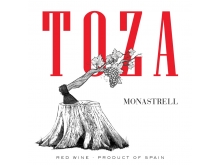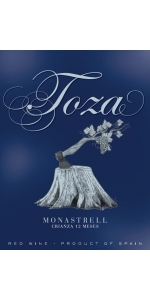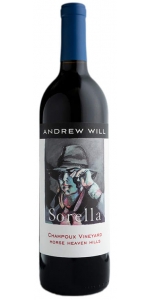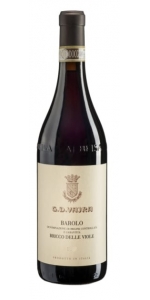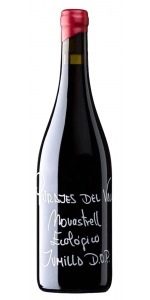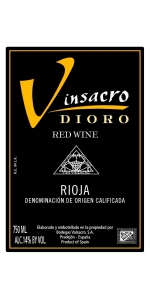Toza Jumilla Monastrell 2019
| Country: | Spain |
| Region: | Jumilla |
| Winery: | San Dionisio |
| Grape Type: | Mourvedre |
| Organic: | Yes |
| Vintage: | 2019 |
| Bottle Size: | 750 ml |
Toza Crianza Jumilla is made from 100% Monastrell (Mourvedre). Toza Crianza is a classic example of the Monastrell variety from the Mediterranean region, made from hand harvested old vines and aged 12 months in oak barrels. This Spanish red is rich, toasty, round and velvety.
Review:
Review:
"Opaque ruby. Dark berries, coconut and a hint of spiciness on the powerfully scented nose. In a round and generous style, showing very good depth and appealing sweetness to the blackberry and cherry cola flavors. Soft, even tannins add gentle grip to a long, smooth finish that leaves hints of vanilla and dark fruits behind. Raised in a combination of French and American oak barrels. - Josh Raynolds"
- Antonio Galloni's Vinous (March 2021), 90 pts
Toza Crianza Jumilla is made from 100% Monastrell (Mourvedre). Toza Crianza is a classic example of the Monastrell variety from the Mediterranean region, made from hand harvested old vines and aged 12 months in oak barrels. This Spanish red is rich, toasty, round and velvety.
Pair with red meat and game casseroles and well-cured cheeses.
Andrew Will Winery Sorella 2019 is made from 80% Cabernet Sauvignon, 8% Merlot, 8% Cabernet Franc, 4% Petite Verdot.
Sorella means sister in Italian and was named after Chris Camarda late sister Jane Camarda. This first vintage was from 1994. This wine is made from 100% Champoux Vineyard fruit and represents the nature of the vineyard by highlighting the Cabernet Sauvignon, which is considered some of the best in Washington State. The picture on the label is a portrait of Annie Camarda (Chris’s late wife).
Review:
Flirting with triple digits, and perhaps the best Sorella yet, the 2019 Sorella explodes from the glass with a fantastic mineral essence that sways between dark red fruit tones, oak essence and freshly opened flowers. Medium to full-bodied, the wine is impeccably balanced with a silky-smooth mid-palate that bestows a stunningly beautiful wine with gobs of complexity and a ripe frame of glossy black raspberry and blackberry fruit tones. Unwinding across the finish, the wine unpacks gorgeous layers that seduce me for a second, third and fourth sip and finally begs me to finish the glass. Buy this ASAP!
-Wine Advocate 99 Points
G.D. Vajra Bricco Delle Viole Barolo is made from 100 percent Nebbiolo.
The Barolo Bricco delle Viole shows the signature verticality of its vineyard. The wine is beautifully layered and - while restrained as it’s always the case in the youth of Bricco delle Viole - it also shows a complexity of layers with purple flowers, sweet spices and mineral tones. The palate is noble, with a refined acid spine and profound tannins that promise a long aging potential.
Among the historical vineyards of Barolo, Bricco delle Viole is the highest and the closest to the Alps. It rises from 400 to 480 meters above sea level, on the Western ridge of the village. Its name, “Hill of Violets”, originates from the flowers that blossom early here due to the perfect south exposure. Up above the fogs, Bricco delle Viole enjoys the earliest sunrise and the last sunset every day. Thanks to its vines dating back to 1949 and -now- 1931, a dramatic diuturnal temperature range and this pure light, Bricco delle Viole generates a sophisticated and profound Barolo DOCG of bright aromatics, chiseled tannins and subtle minerality. 2018 is a vintage that shows many nuances of Bricco delle Viole: beyond the signature verticality of this site, the wine offers high tones laced with mineral nuances and plenty of energy and youth.
Review:
A juicy Barolo, with vibrant acidity and a fluid profile that exudes cherry, raspberry, mown hay, mineral and eucalyptus aromas and flavors. Tight yet long, with excellent potential.
#26 Wine Spectator Top 100 of 2023
The last wine poured at my tasting at the winery is the G.D. Vajra 2019 Barolo Bricco delle Viole. With its high vantage point in the hills west of Barolo, Bricco delle Viole is a world apart in terms of soils (with Sant'Agata marl and fossils) and even harvest times. Slow and careful ripening like the kind that characterizes fruit in 2019 renders a very delicate and ethereal expression with floral tones, wild mint and licorice. This organic wine is solid in build and structure. Indeed, Isidoro Vaira remarks that Nebbiolo tannins have changed since the 1970s and 1980s.
-Wine Advocate 97+ Points
Jeweled in appearance, the 2019 Barolo Bricco Delle Viole may be the best wine I have tried yet from Vajra. Its gorgeous and alluring perfume of fresh roses is followed by a Burgundian, elegant red with incredible length and no harsh edges, fine and present tannins, and beautiful, graceful concentration. It is drinking well now, and I will be trying to get my hands on as much of this as possible. Drink 2025-2045.
-Jeb Dunnuck 97 Points
Full of life, crispy red fruit, with balsamic notes, easy to drink, representing the Mediterranean character.
As a light red wine, it pairs well with tapas, charcuterie, rice dishes, or pizza. It can even complement desserts. The high acidity will take you on a surprising journey.
Dark ruby color. Aromas of cherry, currant, vanilla bean and hint of tar. Full-bodied, with flavors of cherries, cocoa powder and oak. A touch of sweetness on entry with a little bit of air with soft tannins that are starting to integrate well.
The latest step in the project is Vinsacro (formerly Valsacro) Dioro. The earlier Valsacros were made from a field selection of the older vineyards. Now, thanks to the new facility Amador has been able to build an upmarket version of Vinsacro (formerly Valsacro) with a four-stage selection process that includes an initial field selection of the fruit followed by a second table selection as the grapes come into the winery. After fermentation wine from selected tanks is transferred to new French oak barrels for 12-14 months of barrel age. Finally, the best barrels are set aside for Dioro and the remainder used to "upgrade" the normal Vinsacro.
Vinsacro Dioro is a blend of grapes from 100+ year old "vidau" vineyards where many varieties were planted together in the same plot.
Today the grapes are harvested and vinified separately. The final blend depends on the vintage but typically it's Tempranillo (50%), Garnacha (20%) and remaining 30% is a mix of mainly Graciano (10%) & Mazuelo (10%) with a little of Monastrell (5%) & Bobal (5%).
Review:
"The 2019 Vinsacro Dioro Selección is a Vidau field blend sourced from Monte Yerga in Rioja Oriental. Aged for 18 months in French and Eastern European oak barrels, it is only released after five years in the cellar. Dark garnet in color, time in the glass reveals soy sauce, bay leaf and thyme notes, along with black fruit and chutney-like undertones. Dry and rich on the palate, it flows with softened tannins and a clingy mouthfeel, lingering long with an impression of tomato leaf. This is a complex, nuanced and solar red that will warmly captivate your palate."
- Antonio Galloni's Vinous (April 2024), 94 pts
Toza Jumilla Monastrell is made from 100 percent Monastrell.
Toza is a classic example of the Monastrell variety from the Mediterranean region. Clean, bright cherry red color. It is bold with intense fresh red fruits and varietal aromas on the nose. Aged in oak barrels, this Spanish red is rich, toasty, round and velvety.
Bodegas San Dionisio is located in the town of Fuenteálamo in Albacete (Castilla – La Mancha). For centuries, from generation to generation, the winemakers have developed cultivation techniques to take full advantage of the exceptionally hard conditions of the climate and soil. The result is a small production (3,000 kilos per hectare) and a slow ripening process (the most common variety – Monastrell – is harvested at the end of September and all of October) that produces very complex wines with a strong personality, high concentration of aromas and polyphenols.
Toza Crianza Jumilla is made from 100% Monastrell (Mourvedre). Toza Crianza is a classic example of the Monastrell variety from the Mediterranean region, made from hand harvested old vines and aged 12 months in oak barrels. This Spanish red is rich, toasty, round and velvety.
Review:
Review:
"Opaque ruby. Dark berries, coconut and a hint of spiciness on the powerfully scented nose. In a round and generous style, showing very good depth and appealing sweetness to the blackberry and cherry cola flavors. Soft, even tannins add gentle grip to a long, smooth finish that leaves hints of vanilla and dark fruits behind. Raised in a combination of French and American oak barrels. - Josh Raynolds"
- Antonio Galloni's Vinous (March 2021), 90 pts
- back
Leindl Gruner Veltliner Seeberg Kamptal is made form 100 percent Gruner Veltiner. Medium yellow green. Fine yellow apple fruit, delicate hint of quince and honey, candied orange zest, highly attractive bouquet. Juicy, good complexity, extract core sweet, silky texture, fine acidity bow, fine and salty minerality, great length, secure aging potential, a very finesse Veltliner-style.
Review:
“Inviting nose, with layers of quince and elegant, aromatic herb leading through to a richly textured palate of opulent fruit and a fine acidity.”
- Decanter World Wine Awards 2023, 96 pts
Fefinanes Albarino de 1583 Albarino is made from 100% Albarino.
Aged for 5 months in oak barrels (a combination of fine-grained American and French Allier barrels).
1583 is the birth date of the Viscount of Fefinanes, Gonzalo Sarmiento Valladares, builder of the Castle of Fefinanes, in Cambados.
They wanted to pay tribute to their ancestor with this wine that managed to reach a perfect harmony between the fruitiness of the Albarino grape and the complexity brought by the oak aging.
Lovely straw yellow color, clean and bright. The nose is reminiscent of ripe crystallized fruit and spices. The palate is elegant, round and well balanced, with a silky texture.
Excellent with shellfish, grilled or stewed fish, white meats, poultry.

